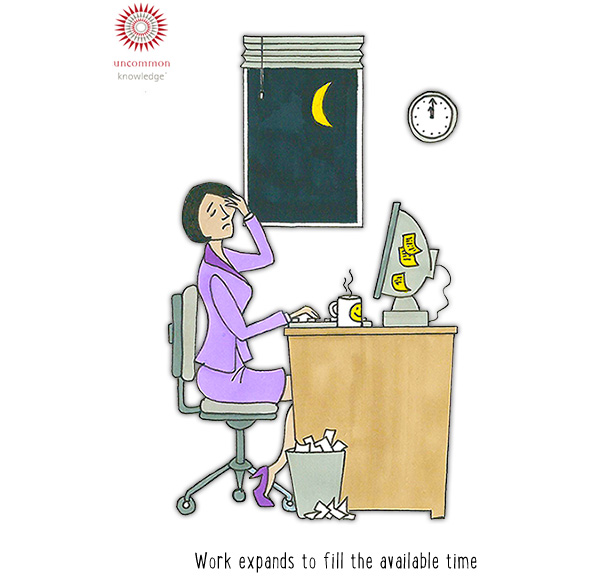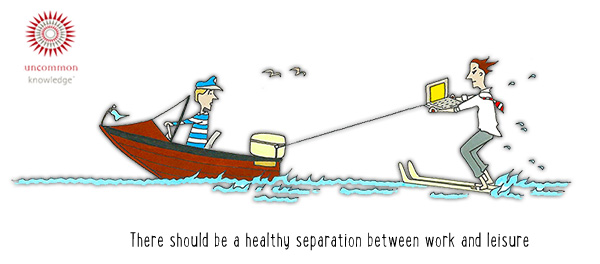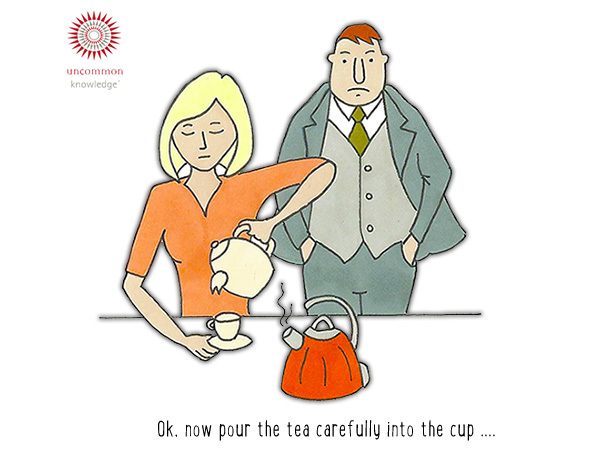I’m sure I’m not alone in thinking it’s unhealthy that sending work emails at 9pm has become normal. For many employees, this isn’t something they do in an emergency or as a one-off, but as a standard expectation of work.
Needless to say, this is not how we get things done at Uncommon Knowledge. Here’s my list of other common working practices we don’t follow, never will, and what we do instead…
Normal Working Practice: Working late/overtime
What we do: 35 hours a week and very little else
I’m a firm believer in Parkinson’s Law: “work expands to fill the available time”.
Mainly because I’ve been there myself! In the past, if I didn’t have a cut-off point, I would work late by filling up my time with coffee breaks and ‘important internet research’. But when I know I only have the next few hours to do a task, then the time pressure adds incentive to stick at it until it’s done. This is mostly because I have less time than I’ve ever had – kids’ll do that to you!
And that’s why I and my staff rarely work past 5pm or work on the weekends. We work hard through the day. And then we go and live life.

Normal Working Practice: Expect staff to be checking work emails at night and on the weekends
What we do: Expect our team to enjoy their leisure time and leave work at work
I do have high expectations. I expect our team to bring their A Game to work every morning and work hard throughout the day. But after 5pm? That’s their time. That’s time for family, friends, and the beach.
You don’t have to be a psychologist to see that today’s culture of long working hours, working during holidays, and working on weekends is unhealthy.
Not to mention that there’s a productivity issue, too. If you’re constantly working, you are probably not working well. I can’t be creative after doing several 12-hour days, but I can if I’ve rested and slept well. And employers shouldn’t expect their people to be any different.

Normal Working Practice: Micro-managing
What we do: Hire the right person for the job and let them do it
I am a terrible micro-manager. I can’t micro-manage myself, let alone ten or so other people.
And I think employers can resist the urge to micro-manage by hiring the right person for the right job.
There’s no point in trying to jam a square peg into a round hole. I have even rewritten job descriptions in the past when it has become clear an employee would be better suited to a different role.
If you are looking for someone to fill an admin role, then ensuring they are detail-minded is very important. Putting a more creative type in that role will only mean they’ll end up feeling bad about themselves, the role won’t be done as well as it could have been, and you won’t be using that person’s actual abilities.
So, instead of micro-managing, we try to hire the right person for the job, train them well, give them plenty of support – and then I tend to sit back and let them work.

Normal Working Practice: No messing about
What we do: We love messing about
I’ve heard some horror stories in my time, but one from a current staff member takes the cake. She once worked for a ‘grey’ (her word) corporate firm where everyone worked in total silence and employees were disciplined if they chatted about anything outside of work matters. Needless to say, she quickly found a new job.
Don’t get me wrong. Here at Unk, every team member likes peace and quiet to get their work done and when we’re working, we’re working. But when we’re funning, we’re funning.
Seeing as work is where we spend so many of our waking hours, I think it has to be an enjoyable place to be. So that’s why we have work outings where we do something vaguely dangerous like coasteering. Or why we’ll sometimes drop everything to gather round to watch a funny YouTube video. Or spend the first few minutes of a meeting chatting before getting started.
Normal Working Practice: Moving house for a job
What we do: Hire locally where possible
We encourage our team to meet their Primal Human Needs both in and out of work, and moving away from your family and friends can hugely impact your primal needs. So we will always hire locally whenever possible or hire a remote worker.






